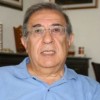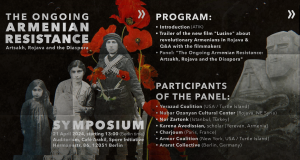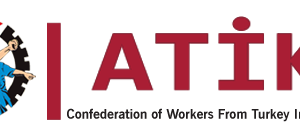 HALUK GERGER| 05-01-2014 | Prof. Dr. Haluk Gerger says the Rojava Kurds face being under siege before the Geneva II conference, adding: “The Kurds will participate with their own identity and are behaving sensibly. However, there is intrigue against them. In the event that the Kurds sit down at the conference with an autonomous administration they will have strategically gained incredible legitimacy as regards international status. It would turn into an irrevocable right. Another important aspect of Rojava gaining status by means of international legitimacy is that Turkey’s policy of not granting any form of status to the Kurds would lose all credibility.” The Kurds in Rojava, who are consolidating their status and national will with every passing day, are preparing to participate at Geneva II for the first time on an international platform with their own identity.
HALUK GERGER| 05-01-2014 | Prof. Dr. Haluk Gerger says the Rojava Kurds face being under siege before the Geneva II conference, adding: “The Kurds will participate with their own identity and are behaving sensibly. However, there is intrigue against them. In the event that the Kurds sit down at the conference with an autonomous administration they will have strategically gained incredible legitimacy as regards international status. It would turn into an irrevocable right. Another important aspect of Rojava gaining status by means of international legitimacy is that Turkey’s policy of not granting any form of status to the Kurds would lose all credibility.” The Kurds in Rojava, who are consolidating their status and national will with every passing day, are preparing to participate at Geneva II for the first time on an international platform with their own identity.
– If we need to determine a framework for the current situation in Rojava, what is the position there?
The Kurds are increasingly broadening their area. There are those who say the 21st century will be the Kurds’ century. Some say they have significant resources. It is true that starting from South Kurdistan the Kurds have obtained status in every part. Rojava is a great gain, but every gain made by the oppressed will bring about a counter attack by the oppressors. After every hurdle another appears. It is true that Rojava has increased optimism, but this should not prevent people seeing that new dangers constantly emerge. It is our duty to draw attention to this. It is not right to just applaud. .
The main factor is the Kurdish question
The Kurds in Syria are in a pincer movement. What was the situation previously? We used to say that the opposition in Syria lost its democratic character when it came to the Kurds, as they’re nationalist. They’re reluctant to grant any rights to the Kurds. Sometimes they are openly hostile. We would criticise them for this. We knew what the Ba’athist regime was about. But the perception was that the regime was on the way out and that while the opposition was opposed to the Kurds the objective conditions and external forces meant that they had to make room for the Kurds. Turkey was a big obstacle. This is correct, the Kurdish question is the main factor determining Turkey’s Syria policy.
The US’s Palace Revolution message
When Hilary Clinton was the US Secretary of State a dynamic emerged that went generally unnoticed. It began with her statements. A tendency emerged in the United States. Turkey learned lessons from Iraq. The view here was that we weren’t in Iraq but we are in Syria. We couldn’t have a military presence in Iraq, and a Kurdish entity emerged. If they get the same status in Syria our Kurdish order will become unsustainable. There has to be a military presence, either a direct military occupation or a buffer zone. The US also learned lessons in Iraq. It learned that an uncontrolled popular opposition independently creates dynamics and consequences that are contrary to the interests of the West, of large capital and of imperialism, on account of its ideological tendencies. It learned that the independence of popular oppositions is not good for them. What is good for them is a collaborationist opposition that can be controlled. To that add the Russian factor in Syria. For these two reasons Clinton said after her meeting with the Russian Foreign Minister, ‘In Iraq we did away with the bureaucracy, the army, the police and the Ba’ath party. Chaos ensued and we lost control. We mustn’t make the same mistake in Syria.’ This was a call for a palace revolution. It was saying to the backbone of the regime, the police and the army: ‘You overthrow Assad. I won’t liquidate all of you.’ This was a message, an appeal. It was also a message to Russia. ‘You have collaborators and allies. Let us protect your interests and collaborate with you. Let us send Assad away’. I mentioned a danger. If there is a palace revolution and the regime remains in place the Kurds will be besieged. Turkey, the nationalist and anti-democratic opposition and the Ba’ath. In that case scenario the Kurds would be under siege and it would be worse.”
On the way to Geneva II a state of siege awaits the Kurds
– From the point of view of the Kurds?
Of course. And consequently from the point of view of democracy in Syria. The US has even agreed that Assad can stay. This means a new state of siege for the Kurds. On the one side the regime will remain, on the other the anti-democratic opposition. And on the other the US and Turkey. And the demands of the Kurds. Now, I’m not saying this coalition would suppress all the legitimate demands of the Kurds, but a coalition of allies in a new Syria would not grant the Kurds their inalienable rights. The Kurds should attend Geneva II separately, not as a force diluted in the opposition. They should take part as a third party, in solidarity and unified. Under this siege they should not abandon their right to their own administration in diplomatic forums under any circumstances, and sit down at the table with a strategy that refuses to discuss this right. As I see it the strategy should be for self rule. In the current world the form of this self rule for the Kurds is autonomy.
Kurds to attend with their own personality
– Two weeks ago the Kurds took the decision to attend the Geneva II Conference on 22 January as a single, joint presence. The will of the Kurds will therefore be represented for the first time on an international platform…
Yes, the Kurds will participate with their own personality. These are very important, strategic developments. Let us see what decisions are made. Hopefully it will continue, but one cannot help but be worried. The Kurds are acting sensibly, but who knows what is being concocted regarding the Kurds?
– In 1954 the first Geneva Conference met to reunite North and South Korea, but Vietnam was divided into two! This is a historical example. You have indicated some threats as regards the Kurds. What do you have to say about this?
In the event that the Kurds sit down at the table possessing their own administration, they will be posing a third strategic question, that of self rule and the right to status, apart from the two important questions we have already mentioned. In this context massive international legitimacy will be attained which will turn into an irrevocable right. How will this be addressed in the constitution of the new Syria? That is a different question, but a main trench will have been dug. In this respect it is a strategic point.
– Turkey will also attend the conference. Turkey’s Rojava policy is apparent. What can you say about this?
Turkey knows what it can and what it cannot achieve. It is an objective reality that in the new Syria and Middle East the existence of the Kurds cannot be refuted, they cannot be condemned to a permanent lack of status and cannot be denied a role as an independent actor in the region. Whatever they may think subjectively they know they cannot surmount this reality. But they will be thinking what they can achieve. But there are subtle ways of doing things. This is what diplomacy is about, to achieve through subtlety what cannot be achieved by force of arms. Turkey wants initially to take the Kurds to Geneva as an obscure, diluted entity within the Syrian opposition.
The right to citizenship is one thing, national rights are something else
– But is this possible?
In my opinion it is not possible. It may sound reasonable at first glance to say the opposition should be within a single framework, but this is a trap for the Kurds. That opposition..
(ANF)
 ATIK | Confederation of Workers from Turkey in Europe | AHM-ATIK News Center
ATIK | Confederation of Workers from Turkey in Europe | AHM-ATIK News Center


